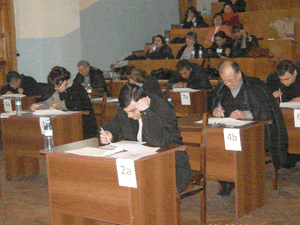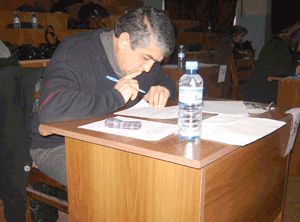 Gela Mtivlishvili, Telavi
Gela Mtivlishvili, Telavi
On December 20, personnel of Kakheti regional administration was tested and only four out of 15 people passed the tests. According to the resolution of the examination commission of the regional administration the aim of the testing was to assess professional skills, qualification, abilities and personal character of the people employed at the regional administration. However, deputy regional governors did not take part in tests.
Giorgi Sibashvili, deputy chairperson of the commission, informed all candidates about the restrictions, methods, rules of evaluation of tests and other issues before the actual testing started, According to the resolution of the examination commission, normative acts or other additional materials are not allowed to use during the tests. Giorgi Ghviniashvili, Kakheti regional governor, who was to be the chairperson of the commission, appeared in the test-hall only once for several minutes. The process was observed by Sibashvili, his deputy. Commission members did not allocate their functions before the tests started and nobody considered the schedule of their work.
Tests started at 11:30 AM. Candidates had five hours to complete the tests. Representatives of the regional non-governmental organizations were observing the tests and soon noticed that candidates could not answer the questions. Two hours after the tests started candidates started going to the toilet very often; supposedly they wanted to receive correct answers by making phone calls from toilet. Representatives of the observing organizations also assisted them. Commission member Aleksandre Kakhidze noticed such instances of what appeared to be cheating and rebuked both the candidate and the observer. However, he did not dismiss the candidate from the exam.
All candidates handed in tests to the commission before time expired. There were 100 questions in tests and each right answer was assessed with one point. Checked tests exposed that only 4 out of tested 15 passed the exam because only they received minimal cut off score of 75 points. Nino Katsiashvili, the head of the chancellery of the regional administration, received 87 points; Shakro Terterashvili, specialist of the administration, received 84 points; specialist Archil Kevkhishvili-82 and lawyer Zita Imanova-81 points. Other employees of the regional administration, Nodar Latibashvili, Gela Kapanadze, Nino Gogiashvili, Badur Guliashvili, Khandolishvili, Gaganashvili, Mari Shashviashvili, Pikria Tsereteli, Eka Kokharidze and Ruslan Jankhoteli did not overcome the 75 percent barrier.
The candidates openly stated soon after the tests ended that questions were too difficult for them. However, it must be mentioned that many of them could not answer such easy questions like “from who should a public official take bribe … and when is information open to the public?” etc.
After the representatives of the non-governmental organizations learned about  results their assessments of the test results varied. Marekh Mgaloblishvili, the head of the Telavi office of the Young Lawyers Association, paid attention to the procedural mistakes made during tests. She did not know who prepared tests; why and based on which regulations candidates received tests and unsealed the packets of answer and keys separately.
results their assessments of the test results varied. Marekh Mgaloblishvili, the head of the Telavi office of the Young Lawyers Association, paid attention to the procedural mistakes made during tests. She did not know who prepared tests; why and based on which regulations candidates received tests and unsealed the packets of answer and keys separately.
Lia Khuroshvili, lawyer for the HumanRights Center: “According to Article 30 of the resolution on examination of the regional administration, the aim of the tests was to increase the effectiveness of the personnel activities in the regional administration. As a result of the testing professional skills, qualification, abilities and personal features of the personnel should be developed in comply with the requests of held positions. Consequently, we expected deputy regional governors also to take part in the exams but two of them were commission members and the third one, Petre Kiknadze, was called out of the testing hall when we demanded his dismissal as being present as non-authorized person. Other employees of the administration of the regional governor did not participate in the testing. We were explained that these people were technical personnel though nobody provided documents to prove their statements. We might suppose they were afraid to stand for exams as well as other candidates. My personal think that none of deputy regional governors could pass tests properly. In addition, I do not think it is necessary for the secretary, operator or representative of the press-service office should know the demands of the Georgian Law on Public Service, law on normative acts, on local self-governance and other laws. I do not protect anyone but these people have specific job and it should have been envisaged during examination.”
Giorgi Sibashvili, the chairperson of examination commission, does not agree with the complaints of the NGOs. However, he does not hide his discontent about the test results. “Complaints of the Young Lawyers Association about not having distributed test and answer papers together are groundless, as there is nothing to be doubtful about. Commission members distributed sealed envelopes of questions and observers provided answers. As for testing, the deputy governors, Aleksandre Kakhidze and I were commission members and could not take participate. Petre Kiknadze had occupied this position several days ago; Nevertheless I am ready to take all kind of tests at any time,” said Sibashvili. The candidates will learn about test results within a week as he stated. If anybody failed tests, we will inform him/her about resignation one month before. Sibashvili also stated that vacancy announcement for the positions in the regional administration will be announced in January of 2009.
Reportedly, public officials from all district administrations in Kakheti region will take obligatory tests in January of 2009. Based on the orders of the district governors, several employees of the district administrations have already provided letters of resignation. NGOs predict the results of examinations will be worse at the level of district administrations. The NGO representatives state that “personnel of the district administrations like regional administration should learn that the Administrative Code does not take into consideration in scoring rules of making coffee and drinking.”



